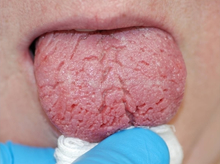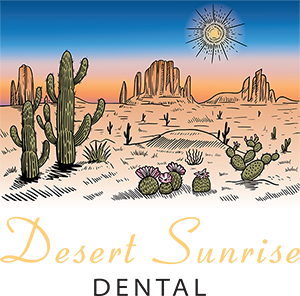Dry Mouth Syndrome
Dry mouth syndrome, also known as xerostomia, is a dry, uncomfortable feeling in your mouth that results from a decrease in the amount of your saliva. Dry mouth syndrome can be temporary or a chronic problem.
One or more factors can cause your salivary glands to function improperly and produce a less saliva than normal:

- Medications (prescription and over-the-counter).
- Medical conditions (Sjögren’s Syndrome, diabetes, stroke or others).
- Emotional stress and anxiety.
The exact number of people suffering from dry mouth syndrome is unknown; however, everyone experiences it to some extent at one time or another. Dry mouth syndrome is more likely to occur among older adults, but it can affect a person of any age.
Signs and Symptoms of Dry Mouth Syndrome
A number of symptoms are commonly attributed to dry mouth syndrome, each of which can be classified as mild, moderate or severe. If you experience any of the following symptoms on an ongoing basis, you should talk to your dentist about xerostomia
Signs and symptoms of dry mouth syndrome include, but are not limited to
- A dry, sticky feeling in the mouth or throat
- Insufficient saliva
- Saliva that feels thick or is stringy
- A rough, dry tongue
- Sore throat
- Bad Breath
- Difficulty swallowing, chewing or talking
- Signs of dryness, such as cracked lips, sores or split skin at corners of mouth
- A burning sensation in the mouth (burning tongue)
- Altered sense of taste
- An infection in the mouth
Causes of Dry Mouth Syndrome
Medications are a common contributor to dry mouth syndrome. For example, dry mouth syndrome is a side effect of more than 400 prescription and over-the-counter medications, such as antihistamines and decongestants that are used to treat allergies and colds, antidepressants used to treat depression, and pain killers and diuretics.
Even high blood pressure medications, muscle relaxants and medications for Parkinson’s disease may cause dry mouth.
Certain cancer treatments including chemotherapy and especially radiation treatments near the salivary glands in the head and neck region – can cause dry mouth syndrome by reducing the amount of saliva production.
For these reasons it is important that you tell your dentist about all the medications you are taking, as well as any other treatments you receive, because they could contribute to dry mouth or affect your oral health in other ways. It is ironic to think that something designed to help you could be causing or contributing to your dry mouth syndrome, but it has proven to be a common problem.
Various medical conditions may contribute to or cause dry mouth syndrome, so it is important that your dentist knows your complete medical history. This includes Sjögren’s Syndrome (a chronic autoimmune disease affecting the moisture-producing glands, leading to dry eyes and dry mouth ), diabetes, Alzheimer’s disease, stroke and other conditions.
If you are under stress or feeling anxious, you may experience dry mouth syndrome. Dry mouth symptoms can also occur as a result of hormone changes from pregnancy or menopause, as well as snoring or breathing with an open mouth.
Consequences of Dry Mouth Syndrome: Why Saliva Is Important
Saliva is approximately 99 percent water, with its remaining components consisting of lubricants that help fight infection, as well as enzymes and proteins that help you digest food. Healthy adults produce an estimated three pints of saliva a day.
Not surprisingly, dry mouth syndrome does more than leave your mouth feeling dry and uncomfortable. Insufficient saliva causes the soft tissues of the mouth to become irritated, making them inflamed and more susceptible to infection. Your tongue may feel sensitive (burning tongue syndrome).
Also, without saliva to wash away food debris and neutralize the acids produced by plaque, your teeth are more susceptible to dental cavities and tooth decay.
What’s more, without the lubricating effect of saliva, you may find it difficult to swallow, talk and chew your food. You may be less able to taste foods, as well. Your throat may be sore and hoarse, and your nasal passages may become dry.
If you have any symptoms of dry mouth syndrome, talk to your dentist.
Wetting Your Whistle Again: Dry Mouth Syndrome Treatments
Once you have told your dentist about your dry mouth symptoms, he or she will examine your mouth for possible complications from dry mouth (cavities, irritation, infection), as well as ask you questions about the symptoms and any medications you are taking. Depending on the severity, he or she may refer you to a specialist, such as a periodontist.
There are a number of simple dry mouth syndrome treatments that are designed to restore moisture to your mouth. Your dentist may recommend:
- Sugar-free candy, sugar-free gum or gum specially made to stimulate saliva flow.
- Specially formulated oral rinses.
- Artificial saliva (saliva substitute).
- More fluid intake (frequent sips of water, sucking ice chips).
- Oral moisturizers (sprays or gels).
- Oral prescription medications to induce saliva production.
Authored By: Allison DeMatteo
Helpful Hints:
- Sip cool water throughout the day, let ice chips melt in mouth (don’t chew ice!)
- Most people do not drink enough fluids and this will contribute to a dry mouth
- Drink one-half of your weight in ounces of water per day
- Try drinking 2% or whole milk with meals
- Milk has moisturizing properties and helps some people to swallow their food
- Restrict caffeine intake – caffeine is a MAJOR cause of dry mouth. Use caffeine-free tea, coffee and sodas
- Eliminating caffeine from your diet will have a significant effect on the symptoms of dry mouth
- If you drink caffeine, for every four ounces of caffeine yu drink, drink eight ounces of water
- Use a cool air humidifier in the bedroom – clean and change water daily
- Start the humidifier an hour or two before bedtime and let it run through the night
- Avoid alcohol and alcohol-containing mouthwashes (read labels of commercial products carefully)
- Alcohol can irritate the tissues and so can foaming agents like sodium lauryl sulfate (SLS)
- If you drink alcohol, for every four ounces of alcohol you drink, drink eight ounces of water
- Use sugar-free candy, gum and beverages, look for products that contain Xylitol (a sweetener that does not cause cavities – IceBreakers Ice Cubes, Spry, Theragum, Epic are all high quality xylitol products)
- Overuse of acidic candies and foods can cause a sore mouth
- Chewing gum will stimulate saliva flow but look for 6g/day of xylitol
- For dry lips, use hydrous lanolin USP (Lansinoh), Banana Boat Aloe with Vitamin E lip balm, or Blistex Herbal Answer during the day and especially at bedtime. Chronic use of Vaseline is drying and should be avoided.
- If possible, sleep on your side in order to reduce mouth breathing
- See your dentist frequently
- People with dry mouth are more prone to oral yeast infections as well as dental cavities
- Excellent hygiene is necessary to prevent cavities and gum disease
Commercial Saliva Substitutes, Stimulants & Moisturizing Gels
The products listed below are available without a prescription and can be found or ordered from many pharmacies. These products are very helpful in alleviating the symptoms of dry mouth. They can be used as often as needed, do not interfere or react with other prescription drugs and do not have side-effects.
Gel:
- Oral Balance (GSK) – 1.5oz tube
- Moisturizing water based gel, especially useful at bedtime
- Spread on tissues and under dentures as needed for long-lasting effects
Toothpaste:
- Biotene Toothpaste (GSK) – 4.5oz tube – available in gel, paste or sensitive varieties
- Mild tasting, gently cleaning toothpaste in blue box, contains MFP fluoride
- Also available in a gel formulation in a green box, contains MFP fluoride
Saliva Substitute Liquid:
Oral Balance Dry Mouth Moisturizing Liquid – 1.5oz (Laclede)
- Stoppers 4 Dry Mouth Spray – 1oz (Woodridge Inc.) 1-888-766-7331 email www.drugstore.com
Authored By: Karen A. Baker, R. Ph., M.S. Associate Professor
